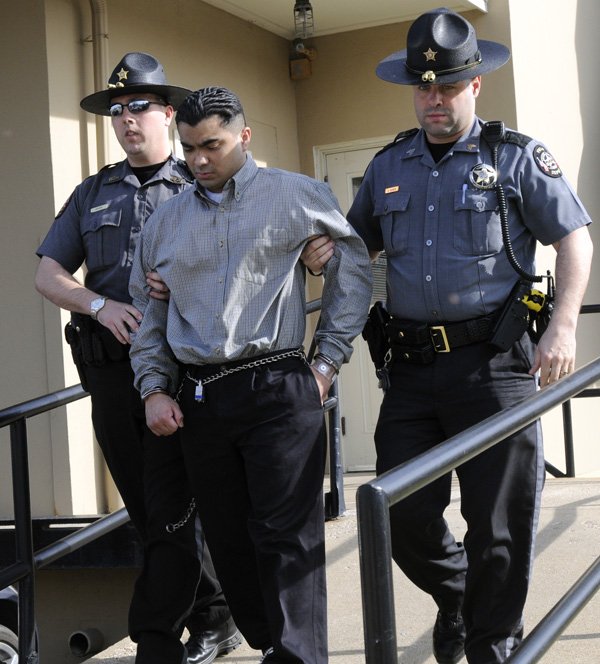BENTONVILLE — Erickson Dimas-Martinez will be put to death by lethal injection for killing a 17-year-old Centerton teenager.
A jury of eight men and women recommended the death sentence after deliberating for more than three hours Thursday afternoon. The panel found Dimas-Martinez guilty of aggravated robbery and capital murder last week.
The panel recommended Dimas-Martinez, 24, serve a life sentence for the robbery and a death sentence be imposed for the murder.
Dimas-Martinez stood surrounded by his attorneys as Circuit Judge David Clinger read the verdicts.
Clinger asked each juror to raise his or her hand if it was their verdict. Each juror raised a hand.
“The court will follow the jury’s recommendation sentence,” Clinger said.
Clinger set an execution date for 10 p.m. July 12. A judge is required to set an execution date, but the date will be vacated because an appeal will be automatically filed.
Jefferson’s body was found Dec. 30, 2006, in the driveway of a Springdale home. He had been shot once in the head.
Two sisters testified during the trial they watched as Dimas-Martinez and Uris Magana-Galdamez robbed Jefferson at gunpoint. They took $30 from Jefferson and stripped him of his coat and shirt. Dimas-Martinez then shot the shirtless Jefferson.
Jurors unanimously found two of the three aggravating factors prosecutors cited for seeking the death penalty were present. They found the crime was committed for monetary gain and murder was committed to evade arrest.
Defense attorneys made an effort to convince the jurors Dimas-Martinez was mentally retarded, but no juror believed that claim.
Defense attorneys also listed numerous mitigating factors related to Dimas-Martinez’s childhood in El Salvador and his living with an abusive father when he came to the United States as a teenager.
All the jurors believed some of the mitigating factors but did not believe they outweighed the aggravating factors.
“(Dimas-Martinez) is not a murderer by upbringing or circumstance,” Benton County Prosecutor Van Stone said. “He’s a killer by choice. He’s a killer by choice.”
Stone described Dimas-Martinez as a “proud killer” and asked jurors to remember photographs where Dimas-Martinez was shown wearing Jefferson’s clothing.
Katherine Streett, one of Dimas-Martinez’s attorneys, urged jurors not to be guided by emotion in reaching a verdict.
She held a photograph of the murdered teen and stepped toward the jury.
“When you look at photograph like this, it’s hard to shift focus on anything else,” Street said. “It would be wrong for me to tell you to disregard what happened to Mr. Jefferson.”
Streett attacked the prosecution’s aggravating factors and told jurors prosecutors had to prove each one beyond a reasonable doubt.
Streett claimed the robbery portion of the crime ended when Jefferson was shot. She discounted the claim the murder was committed to avoid arrest.
Streett told jurors there was no sophisticated plan to kill Jefferson.
“He took two witnesses to a planned murder,” Streett said. “Are you kidding me?”
Streett told the panel the murder was not a planned killing.
“Can you send him home?” Streett asked the jurors. “No. You can lock him up forever.”
She displayed a photograph of Dimas-Martinez as a child.
“That young man sitting over there is this little boy growing up, and the state is asking you to kill him,” Streett told the jury. “Your job is not to fix this. The only way to fix this for Derrick Jefferson’s family is to bring back Derrick Jefferson healthy and whole. You can’t do that.”
However, the panel could limit the damage to another family, Streett said.
“You don’t have to show compassion for Erickson, but show compassion and mercy for his family,” Streett said.
Stone said he was pleased with the verdict.
“It’s one of those cases we felt like needed to be taken to a jury,” Stone said. “It was just a senseless homicide. We felt the community needed to weigh in on it.”

